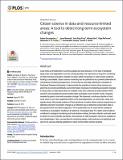Por favor, use este identificador para citar o enlazar a este item:
http://hdl.handle.net/10261/203080COMPARTIR / EXPORTAR:
 SHARE SHARE
 CORE
BASE CORE
BASE
|
|
| Visualizar otros formatos: MARC | Dublin Core | RDF | ORE | MODS | METS | DIDL | DATACITE | |

| Título: | Citizen science in data and resource-limited areas: A tool to detect long-term ecosystem changes |
Autor: | Gouraguine, Adam; Moranta, Joan CSIC ORCID ; Ruiz-Frau, Ana CSIC ORCID ; Hinz, Hilmar CSIC ORCID ; Reñones, Olga CSIC ORCID; Ferse, Sebastian C. A.; Jompa, Jamaluddin; Smith, David J. | Fecha de publicación: | 9-ene-2019 | Editor: | Public Library of Science | Citación: | PLoS ONE 14(1): e0210007 (2019) | Resumen: | Coral reefs are threatened by numerous global and local stressors. In the face of predicted large-scale coral degradation over the coming decades, the importance of long-term monitoring of stress-induced ecosystem changes has been widely recognised. In areas where sustained funding is unavailable, citizen science monitoring has the potential to be a powerful alternative to conventional monitoring programmes. In this study we used data collected by volunteers in Southeast Sulawesi (Indonesia), to demonstrate the potential of marine citizen science programmes to provide scientifically sound information necessary for detecting ecosystem changes in areas where no alternative data are available. Data were collected annually between 2002 and 2012 and consisted of percent benthic biotic and abiotic cover and fish counts. Analyses revealed long-term coral reef ecosystem change. We observed a continuous decline of hard coral, which in turn had a significant effect on the associated fishes, at community, family and species levels. We provide evidence of the importance of marine citizen science programmes in detecting long-term ecosystem change as an effective way of delivering conservation data to local government and national agencies. This is particularly true for areas where funding for monitoring is unavailable, resulting in an absence of ecological data. For citizen science data to contribute to ecological monitoring and local decision-making, the data collection protocols need to adhere to sound scientific standards, and protocols for data evaluation need to be available to local stakeholders. Here, we describe the monitoring design, data treatment and statistical analyses to be used as potential guidelines in future marine citizen science projects. | Versión del editor: | http://doi.org/10.1371/journal.pone.0210007 | URI: | http://hdl.handle.net/10261/203080 | DOI: | 10.1371/journal.pone.0210007 | E-ISSN: | 1932-6203 |
| Aparece en las colecciones: | (IMEDEA) Artículos |
Ficheros en este ítem:
| Fichero | Descripción | Tamaño | Formato | |
|---|---|---|---|---|
| citizen_science_data_resource-limited_areas.pdf | 1,08 MB | Adobe PDF |  Visualizar/Abrir |
CORE Recommender
PubMed Central
Citations
5
checked on 13-abr-2024
SCOPUSTM
Citations
36
checked on 24-abr-2024
WEB OF SCIENCETM
Citations
35
checked on 25-feb-2024
Page view(s)
169
checked on 29-abr-2024
Download(s)
97
checked on 29-abr-2024

